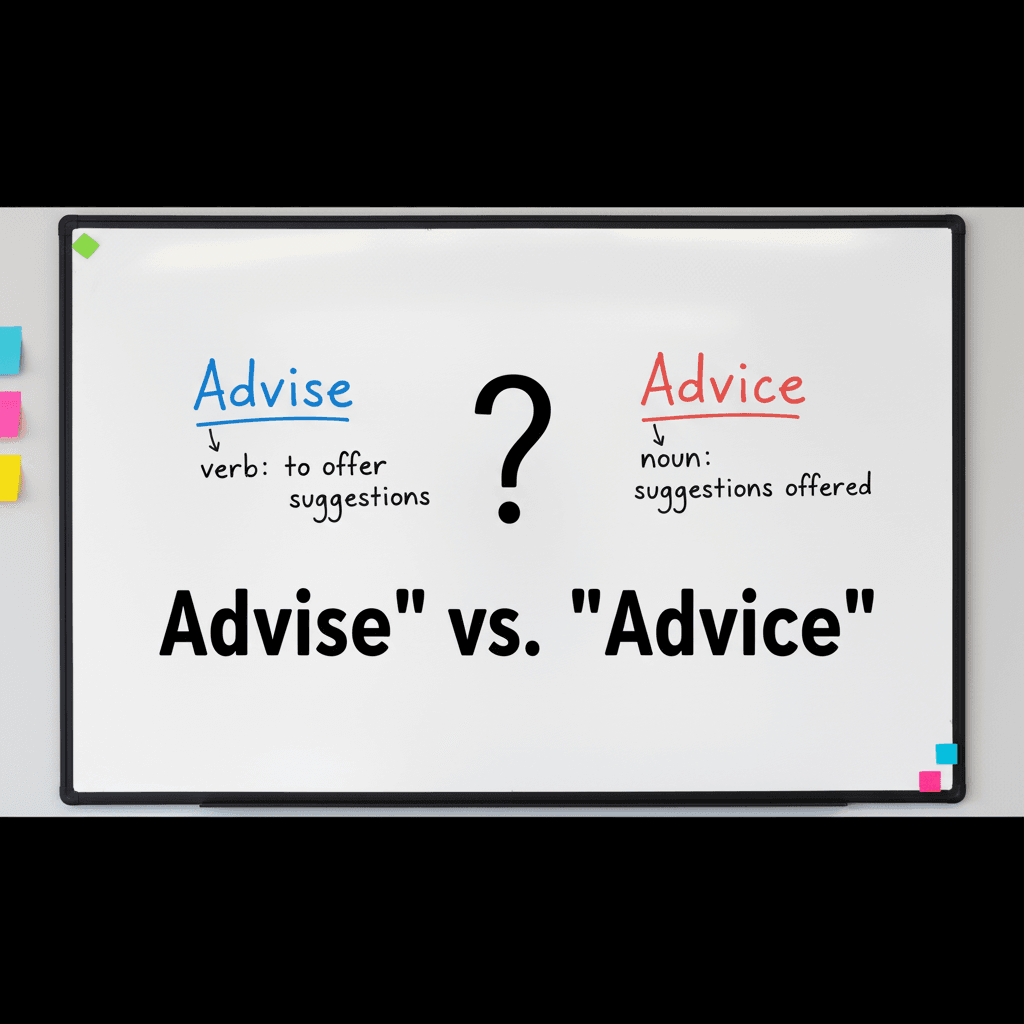Advise vs. Advice: What’s the Difference?
 The words advise and advice are closely related, but they aren’t interchangeable.
The words advise and advice are closely related, but they aren’t interchangeable.
They differ in part of speech, pronunciation, and usage.
Here’s the quick rule:
- Advise → verb → means to give guidance or suggestions 🗣️
- Advice → noun → means the guidance or suggestions themselves 📝
1. Advise: The Verb
Meaning
“Advise” means to recommend, to suggest, or to give someone an opinion about what they should do.
It’s an action word (verb) — it describes what someone does.
Pronunciation
/əd-ˈvaɪz/ — ends with a “z” sound.
Examples (10 total)
- I advise you to take a break.
- Doctors advise patients to drink more water.
- My lawyer advised me not to sign the contract.
- Teachers often advise students to study early.
- The guide advised us on what to pack.
- I wouldn’t advise going there at night.
- He advised her to save her money.
- Can you advise me on the best option?
- The doctor advised rest and hydration.
- We advise caution during heavy rain.
🧠 Tip:
If you can replace it with “recommend,” use advise.
“I advise you to rest.” = “I recommend you rest.” ✅
2. Advice: The Noun
Meaning
“Advice” refers to the suggestion, opinion, or recommendation given to help someone decide or solve a problem.
It’s a thing, not an action — so it’s a noun.
Pronunciation
/əd-ˈvaɪs/ — ends with a “s” sound.
Examples (10 total)
- Thank you for your advice.
- My dad always gives great advice.
- She followed the doctor’s advice.
- I need some advice about my job.
- His advice helped me a lot.
- That’s good advice — I’ll try it.
- You should listen to their advice.
- I didn’t take his advice, and I regret it.
- Can you give me some advice on writing?
- Her advice was simple but effective.
🧠 Tip:
If you can say a thing or some guidance, use advice.
“He gave me good advice.” ✅
“He adviced me.” ❌ (wrong verb form — should be advised)
3. Quick Comparison Table
| Feature | Advise | Advice |
|---|---|---|
| Part of speech | Verb | Noun |
| Meaning | To give suggestions | The suggestions themselves |
| Pronunciation | /əd-ˈvaɪz/ (ends with “z”) | /əd-ˈvaɪs/ (ends with “s”) |
| Example | I advise you to rest. | Thank you for your advice. |
| Common error | ❌ He adviced me. | ✅ He advised me. |
4. How to Remember
👉 Advise = action → ends with -ise
👉 Advice = thing → ends with -ice
💡 Memory Trick:
“I advise (with a Z) to take my advice (with an S).”
(Z = verb, S = noun)
5. Common Mistakes
❌ He gave me a good advise.
✅ He gave me good advice.
❌ She adviced me to call the doctor.
✅ She advised me to call the doctor.
❌ I need an advise.
✅ I need some advice. (Uncountable noun)
6. Why It’s Confusing
They come from the same root — the Latin advisare, meaning to consider.
Over time, English developed two separate forms:
- advise (the action of giving guidance)
- advice (the guidance itself)
Modern writing tools like Humanizey can automatically detect and correct these tricky word pairs — ensuring you always use the right one in context.
FAQs
1. Can “advice” be plural?
No. It’s an uncountable noun.
Say some advice or a piece of advice — not advices.
2. Is “advise” formal?
It’s neutral — works in both formal and casual writing.
3. Can I say “advise on”?
Yes.
“Can you advise me on my essay?” ✅
4. What’s the opposite of “advise”?
Discourage or dissuade.
Practice: Choose the Correct Word (“Advise” or “Advice”)
(Answers are listed at the end.)
- Can you give me some good ___?
- I strongly ___ you to rest.
- She followed her doctor’s ___.
- My lawyer ___ me to wait.
- That’s great ___, thank you!
- He always ___ me on business matters.
- Their ___ saved us a lot of trouble.
- I wouldn’t ___ going there alone.
- His ___ was exactly what I needed.
- Our teacher ___ us to stay calm.
Answers
- advice
- advise
- advice
- advised
- advice
- advises
- advice
- advise
- advice
- advised
